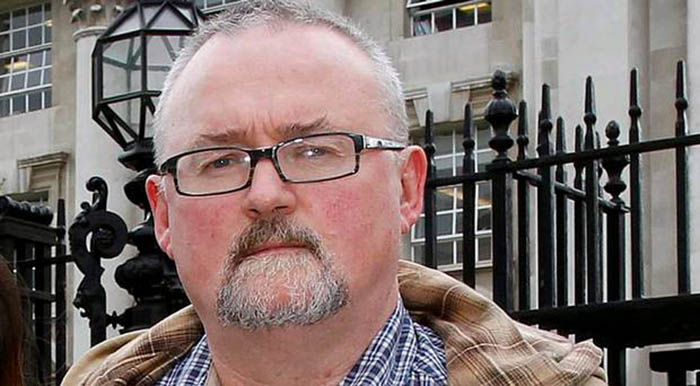28 Jun 2019 | Academic Freedom, Campaigns, News and features
[vc_row][vc_column][vc_column_text]
Former IRA member Anthony McIntyre has been granted a UK Supreme Court hearing in an attempt to stop the Police Service of Northern Ireland getting hold recordings of interviews he gave about his role during the so-called “Troubles” in Northern Ireland.
The recordings are part of the Belfast Project, an oral history of Irish republican and loyalist paramilitaries at Boston College, that was directed by journalist Ed Moloney with McIntyre as a researcher. The recordings, gathered between 2001 and 2006, were made on the condition that their content would not be made public until after the death of interviewees except where they had given written permission for their use otherwise.
“These tapes were made solely for academic purposes. They were never intended to be used for criminal investigations,” McIntyre said. “I welcome the fact that the Supreme Court will now hear this case given the important issues at hand.”
Through a mutual legal assistance treaty between the USA and the UK for co-operation in the investigation and prosecution of crime, the PSNI issued subpoenas in 2011 to gain access to recordings made of IRA volunteer Dolores Price as part of their investigation into the disappearance and murder of Belfast mother of ten Jean McConville in 1972. Moloney and McIntyre were unsuccessful in their legal challenges against this subpoena. As Boston College’s legal protections were insufficient to secure the confidentiality of the tapes in the face of British inquiry, the PSNI were granted access to eleven tapes after a legal battle in US courts.
In 2016 the British government subpoenaed Boston College to obtain interviews with McIntyre. Moloney said at the time that the British government was acting on behalf of the PSNI.
In October 2018, McIntyre attempted to stop the investigation via judicial review, pointing out numerous errors in the International Letter of Request sent to Boston College by the PSNI to obtain copies of the tapes. He lost his legal battle to stop the authorities accessing the recordings.
In the latest issue of Index on Censorship magazine, McIntyre said the attempts by police to obtain the tapes have “limited understanding of the conflict” and have impacted on the ability of future historians and researchers. “It also puts police in charge of what society will know about major areas of activity that is deemed illegal,” he added.
The Supreme Court is expected to sit in early October 2019. In the meantime, the tapes remain unopened at the Royal Courts of Justice until a final verdict is reached. [/vc_column_text][/vc_column][/vc_row][vc_row][vc_column][vc_basic_grid post_type=”post” max_items=”4″ element_width=”6″ grid_id=”vc_gid:1561712121963-f6ad8d7e-7a39-5″ taxonomies=”8843″][/vc_column][/vc_row]
6 May 2009 | Comment, News and features
 Police threats to use anti-terror powers, forcing Irish reporter Suzanne Breen to hand over materials relating to dissident republican groups are an affront to journalistic ethics and free expression, says Anthony McIntyre
Police threats to use anti-terror powers, forcing Irish reporter Suzanne Breen to hand over materials relating to dissident republican groups are an affront to journalistic ethics and free expression, says Anthony McIntyre
On Monday of last week a Police Service of Northern Ireland (PSNI) officer turned up on the doorstep of award-winning Sunday Tribune northern editor and mother of one Suzanne Breen’s Belfast home.
The PSNI’s interest had been aroused by Breen’s Sunday Tribune stories relating to the deaths of two British soldiers in County Antrim in March and the killing of the informer Denis Donaldson in the Irish Republic three years ago. Breen, in her journalistic pursuit of the facts, spoke to the Real IRA. The organisation revealed to her that it had carried out all three killings.
Breen described the police visit:
‘Detectives wanted my computer, disks, notes, phone, and any material relating to stories I’d written about the Real IRA … I was given three days to comply. If I didn’t, they’d seek a court order under the Terrorism Act. I won’t be complying. The duty of a reporter to protect their sources is part of the National Union of Journalists’ code of conduct. It doesn’t matter whether those sources are police, paramilitaries, politicians, or civil servants … compromising sources undermines the freedom of the press. Journalists and police do different jobs. Our role is to put information into the public domain. If a journalist becomes a gatherer of evidence or witness for the state, they cease being a journalist.’
At the start of April, shortly after the killings of the two soldiers, the deputy first minister in Northern Ireland, Martin McGuinness, was reported in the Belfast Telegraph to have lambasted what he called ‘dissident journalists’ who give more attention to the Real IRA than Mr McGuinness felt appropriate. He was also said to have claimed that the journalists in question were ‘giving succour to these people’.
It was an approach previously adopted by McGuinness’s predecessors in the North, including Roy Mason who, to use the memorable phrase coined by Margaret Thatcher, sought to starve those politically violent groups of the oxygen of publicity.
When Martin McGuinness remarked on these ‘dissident journalists’, some of Suzanne Breen’s friends and colleagues, of whom I am one, contacted her to express concern. McGuinness had recently been given to criticising his former comrades, on one memorable occasion denouncing them as ‘traitors’, and it seemed any journalist seen to be publicising the claims or views of those former comrades would not escape his wrath. Now with the PSNI action against Breen the view that he was tipping the scales in favour of some sort of move against her has been reinforced.
Ms Breen had long been a thorn in the side of the minister and his party colleagues. She had delved deeper than most journalists into the workings of the Northern Ireland peace process. Sinn Féin often took umbrage at Breen’s journalism.
As has so often been the case in Northern Ireland it seems the journalists who ask the most difficult questions are those who receive the most hassle from the state and its security apparatuses. Ed Moloney, Liam Clarke and Kathryn Johnston prior to Suzanne Breen were hounded by the police. In their cases all three fought a determined action against police encroachment on journalistic sources and won the day.
If journalists gathering information to better inform the general public about their society, including the people that society outlaws, are forced to pass that information on to the state what possible chance of any of those outside the law coming forward with information that is essential for the enhancement of public understanding? Would society really be better off had Suzanne Breen not spoken to the Real IRA? As she argues ‘a new form of Section 31 won’t make the Real IRA go away, any more than the original affected the Provisionals’. Section 31 was the legislation which for long was used in the Irish Republic to censor Sinn Féin. It was a draconian power that kept the Irish public in a state of permanent ignorance about a problem that needed more rather than less information to solve it.
Commenting on the Moloney case of a decade ago Breen claimed that despite Moloney’s victory ‘the PSNI is pursuing the same strategy, against the same paper, with a different northern editor. It didn’t work then, and it certainly won’t work now.’ She went on to point out that over the years as a seasoned journalist she has interviewed people associated with many armed parties to the Northern conflict. No one from the state came harassing her. Why now?
Given that there is no information other than what she has already placed in the public domain that she can give to the police –– or should provide given that the only information she acquired was in her capacity as a journalist, and that should always remain off limits to the state –– the police investigation may have resulted from Martin McGuinness’s comments being interpreted as political pressure. If I am mistaken and Martin McGuinness opposes the PSNI concentration on Suzanne Breen then we can expect him to denounce it. So far he has not.
In an era much heralded as a new beginning, where political policing was supposed to have been a thing of the past there has been a strengthening of the type of powers long associated exclusively with political policing, including the use of 28-day detention period for people being questioned in police custody and the construction of a ‘supergrass’ unit in Maghaberry prison. This situation is exacerbated by the renewed assault on journalism.
The Sunday Tribune is backing its northern editor. Editor Nóirín Hegarty said: ‘this paper fully supports its northern editor. Our stories were clearly in the public interest. We stand firm in upholding journalistic ethics and the protection of sources, and we will continue to do so to the highest level.’
The National Union of Journalists is doing likewise. Its General Secretary Jeremy Dear commented: ‘if the police and security services believe they can force journalists to become part of intelligence-gathering operations, the very future of independent journalism will be put at risk.’
Professor Brice Dixon of Queen’s University’s Law School, and long the head of the Northern Ireland Human Rights Commission, added his shoulder to the wheel: ‘It’s essential to the running of a healthy democracy that investigative journalists be allowed to go about their perfectly lawful activities without being impeded or constrained by police. What the PSNI are proposing to do is, in my view, a perversion of the Terrorism Act.’
Journalists and anti-censorship activists everywhere should rally behind this robust position and ensure that Suzanne Breen is not marginalised and subject to punitive sanction by the state. She has been an outstanding journalist in her coverage of the Northern Irish conflict. With those formerly on the receiving end of British state censorship now seemingly calling for more of it, journalists more than ever are left to defend the pass which the state should not be allowed to breach. Fearless journalists like Suzanne Breen cannot be allowed to become isolated and left to defend that pass on their own.
Anthony McIntyre is a former IRA prisoner and the author of Good Friday, The Death of Irish Republicanism



